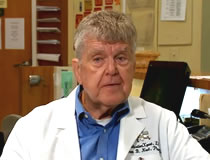September 9th, 2012
Vitamin Studies Spell Confusion for Patients
If it's Monday, it must be bad news about multivitamin day -- or was that Wednesday? No, Wednesday was good news about vitamin D, not so good news about vitamin E -- if you're confused, join the club.
The alphabet soup of vitamin studies making headlines in the last few weeks has left more than one head spinning, and most clinicians scrambling for answers.
As the dust begins to settle, physicians interviewed by MedPage Today and ABC News agreed on a bit of simple wisdom -- a healthy diet is more important than a fistful of supplements.
"I had already asked my patients to stop their vitamin supplements four to five years ago, with the exception of those with a deficiency of vitamin D, ... pregnant patients [who should get] folate and prenatal multivitamins, or those with cognitive impairment, when I would recommend a vitamin B complex," Albert Levy, MD, a primary care physician in New York, said in an email to MedPage Today and ABC News.
Whether patients heed the advice is another question, as recent research has shown that more take supplements now than ever before. More than half of Americans report taking a multivitamin or other dietary supplement, up from 40% just two decades ago.
And there's sure to be pushback from the largely unregulated dietary supplements market -- estimated to be a $20 billion industry -- which has already launched multiple critiques of the latest evidence.
The Deluge
Here's a sample of the supplement headlines over recent weeks: B12 deficiency leads to cognitive decline, vitamin D helps fight off tuberculosis, vitamin E ups the risk of prostate cancer, calcium won't improve outcomes for Mom or baby.
The one that garnered particular attention reported an increased risk of death in postmenopausal women taking multivitamins, as well as vitamin B6, folic acid, iron, magnesium, zinc, and copper.
Though multivitamins carried only a slightly increased mortality risk, many clinicians say they've written off the supplement for good.
That's because multivitamins were never recommended on the basis of strong evidence anyway, David Katz, MD, of Yale's prevention research center, told MedPage Today.
"What we had was a notion that this was an insurance policy," he said in an interview. "Many people don't eat the way they ought to, so they're not getting the optimal doses of nutrients from food. Instead, we can rely on a pill that ought to do you some good, and certainly couldn't do you harm. That was the thinking."
But more studies have suggested that the health outcomes in patients taking multivitamins appear to be slightly worse, Katz said.
Still, he cautions that the present study is merely observational and can't prove cause and effect. For instance, some patients may take supplements as a result of being diagnosed with a condition, or they take them because they have a family history of chronic disease and are trying to prevent it, he said.
And clinicians certainly are not concerned that taking multivitamins will kill their patients. It's just that there is no longer a dearth of evidence that they won't confer any harm at all, Katz said.
"Considering the weak basis for recommending multivitamins in the first place," he said, "when you combine that with evidence that maybe it could hurt, the rationale for making routine use of multivitamins goes away."
Which Supplements Are Supported?
That's not to say supplements shouldn't be used at all, Katz said. He recommends omega-3 fatty acids and vitamin D for most of his patients, plus calcium for women. Prenatal vitamins and folic acid supplementation are also on that list.
There's evidence behind those supplements, he said. The GISSI trial found cardiovascular benefits for omega-3s. Study after study has shown that the majority of Americans are deficient in vitamin D, and the supplement study flood included more positive findings for folic acid supplementation around the time of conception.
As for the rest of the supplement lot -- give them only in the face of deficiencies, Katz said.
It's long established, for instance, that B12 deficiency plays a role in dementia and other neurological disorders, and supplementation can stave that off.
As well, certain vitamins are established treatments for a host of diseases, from vitamin C in scurvy to B12 in pernicious anemia.
Who Is Deficient?
But how can clinicians be sure that their patients actually need specific nutrients, especially since there are usually no obvious symptoms?
Katz said, in most cases, doctors should ask about their patients' diets and about what vitamins they currently take, though he makes the exception for children who are meeting growth milestones or for adults with good muscle tone.
The majority of clinicians reporting in a MedPage Today poll -- 70% -- said they supported annual screening of specific vitamin levels to treat deficiencies.
They may simply be following recommendations -- in June, the Endocrine Society recommended screening for vitamin D deficiency in at-risk patients, setting various levels of treatment for different risk populations, to keep at bay rickets and bone complications.
Rise and Fall
Just as vitamin E was recently found to be unable to prevent prostate cancer -- it was actually associated with an increased risk of developing the cancer, albeit a "marginally significant" one -- several other nutrients once touted for their preventive benefits flopped in trials.
"We fell in love with vitamin C in middle of the century, but trials didn't confirm the benefits of preventing colds or cancer," Katz said.
Similarly, B-complex vitamins promised to lower heart disease risk, he said. While they did lower homocysteine, trials turned up no clinical cardiovascular benefits.
The carotenoid antioxidants beta-carotene and lycopene also proved to be a bust, with both having no benefit in prostate cancer and the former no use in eye disease nor heart disease.
"We have a long litany of barking up the wrong tree," Katz said.
Why Don't They Work?
It's not clear why these vitamins don't do what they're expected to do, and researchers are actively looking into why.
The latest theory is that vitamin isolates don't work quite as well on their own. The vitamin E isolate used in the prostate cancer trial was alpha-tocopherol, which is only one in the family of E-complex vitamins, Katz said.
Rather, it may take the full blend of antioxidants and phytochemicals found within the context of a whole food in order to deliver any potential benefits.
That appears to concur with clinician consensus on the majority of supplements, particularly in healthy patients: they're not needed. Eat a healthy diet instead.
"[Patients] should stop trying to look for health in a pill," Lee Green, MD, of the University of Michigan, said in an email. "Health is not found in pills. It's found in good food and regular exercise. There's something in our psyche that makes us want to believe in magic, and that desire to believe has focused on vitamins."
- October 10th, 2014
NSAIDs May Boost Risk of Venous Thromboembolism Read - November 28th, 2012
Sometimes there are things more important than MONEY....Read - August 18th, 2012
What would you do if you saw someone collapse?Read - September 9th, 2014
Wockhardt Recalls Blood Pressure DrugRead - June 26th, 2015
New Drug Promises Relief from Tinnitus, EpilepsyRead
Geriatric Nutrition
Without good nutrition, positive drug therapy outcomes are very difficult to obtain, For the best in Geriatric Nutritional Information
Find out more Optima SolutionsContinuing Education
Each month we will post an analysis of specific aspects of government long-term healthcare regulations.
Find out more


